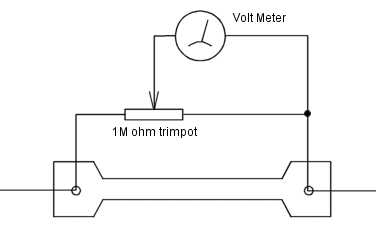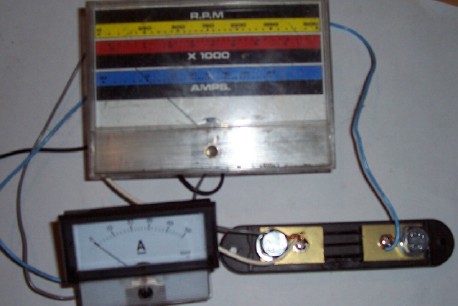
|

|
Forum Index : Windmills : measuring amps
| Page 1 of 2 |
|||||
| Author | Message | ||||
| clarence Regular Member Joined: 27/10/2006 Location: Posts: 63 |
Hi all, I am looking for tips to fairly accurately measure amps, up to 100 amps @ 12v, without spending too much money. I only have a 10 amp multimetre 
Anyone got any ideas? clarence. |
||||
Bryan1 Guru Joined: 22/02/2006 Location: AustraliaPosts: 1344 |
Hiya Clarence, Take a look on ebay for newspower they are an irish mob the sell current and volt meters on ebay. I got myself a 200 amp current meter and shunt and it only cost about $45 for both the meter and 200 amp shunt. I reckon this would be a cheap option for you. Cheers Bryan  |
||||
| Gizmo Admin Group Joined: 05/06/2004 Location: AustraliaPosts: 5078 |
Need a shunt. On my big old amp meter I used a length of steel plate. Its about 100mm long, 10mm wide, and 1mm thick, with a bolt hole at each end. Add a voltmeter and a trim pot to calibrate the scale. Then you just need to adjust the trim pot with a known amp draw. 
Glenn The best time to plant a tree was twenty years ago, the second best time is right now. JAQ |
||||
| clarence Regular Member Joined: 27/10/2006 Location: Posts: 63 |
thanks guys, I will look into those options. |
||||
| Pt w/field Matt Senior Member Joined: 24/02/2006 Location: AustraliaPosts: 105 |
hi glen just a thought could you put 60amp car guages in parallel and read off current flow off both? matt down south |
||||
| clarence Regular Member Joined: 27/10/2006 Location: Posts: 63 |
I wonder how accurate those car metres are? |
||||
| Pt w/field Matt Senior Member Joined: 24/02/2006 Location: AustraliaPosts: 105 |
check them agaist your digital meter matt down south |
||||
| clarence Regular Member Joined: 27/10/2006 Location: Posts: 63 |
good idea, now I just have to remember where I put those old amp metres. |
||||
| dwyer Guru Joined: 19/09/2005 Location: AustraliaPosts: 574 |
Car metres are not always accurate is depend how much currect running though as heat build up and change the amp metre reading if is not important to you dwyer |
||||
| makourain Senior Member Joined: 19/04/2006 Location: Posts: 111 |
edit: i posted the car amp meter idea before reading the other peoples posts :S |
||||
| KiwiJohn Guru Joined: 01/12/2005 Location: New ZealandPosts: 691 |
Clarence, it is times like this one calls on Mr Ohm. How long are your leads? The ones that will be carrying the current? What size is the wire? Armed with this knowledge you can determine the resistance of the wire (all wire has resistance). If you know the resistance you can find the voltage drop for any current. volts = current x resistance. Suppose your wire has a 0.01 ohm resistance and you have 100 amps, thats 1 volts. I guess your multimeter can measure that? So, do you know the size and length of those wires? |
||||
| Pt w/field Matt Senior Member Joined: 24/02/2006 Location: AustraliaPosts: 105 |
yeah but that can change with temp too just like car ampmeters,ive got 3 multimeters an they all read different readings on 12v,which one is correct,theres 1 volt between them matt down south |
||||
| KiwiJohn Guru Joined: 01/12/2005 Location: New ZealandPosts: 691 |
I give up. |
||||
| clarence Regular Member Joined: 27/10/2006 Location: Posts: 63 |
when I get around to it my alternator will be driven by a large induction motor with a pulley geared to about 300 rpm, and the output leads will be very heavy gauge and less than a metre long. I dont know what the volts will be but I will calculate the amps depending on the voltage it is. Does anyone have any idea what amps a standard f&p 1mm wire 3 phase, wired star produces at 300 rpm? ball park? I would love to know, to compare my neo monstrosity. thanks. |
||||
| Highlander Senior Member Joined: 03/10/2006 Location: AustraliaPosts: 266 |
Hey Glenn, love your shunt/pot combo. I just bought a 50 amp & shunt for $41 Then the very next day found the bigger meter in a garage sale for $2 Works fine but must have another internal shunt as 2A reads 1A 10A reads 5A etc. It's always halve the real current draw. I'll just change the graphics from -10A/+60A to -20/+120A 
If I want to re-calibrate a meter by looks of your diagram you can do it with a pot. So a 10A meter could be turned into a 100A or 50A meter, am I presuming right? Clarence don't know about 1mm wire but my .8 3phase with ferrite magnets produced 17.5A @ around 400-500 rpm hope that helps a little. Central Victorian highlands |
||||
| Gizmo Admin Group Joined: 05/06/2004 Location: AustraliaPosts: 5078 |
Yeah thats right, but you need to watch the power dissipated by the shunt. A shunt designed for 10 amps would get very hot with 100 amps flowing through it. Thats why I used strips of steel plate. Any bit of steel will show a voltage across it when there is current flowing thought it, even a 4 inch nail will do. So I rig up the steel shunt, pull some current through it, like 5 amps, and adjust the meter using the trimpot to read the correct value. Thats it, calibrated. Glenn The best time to plant a tree was twenty years ago, the second best time is right now. JAQ |
||||
| clarence Regular Member Joined: 27/10/2006 Location: Posts: 63 |
I will guess at this stage that a standard f&p 1mm wire 3 phase at 300 rpm wired star would be around 10-15 amps. but if anyone has some accurate data to share, it would be most helpful. |
||||
| Pt w/field Matt Senior Member Joined: 24/02/2006 Location: AustraliaPosts: 105 |
hi clarence go to the innovation site information/smart drive under heading getting smart with smart drive 135KB pdf and theres a grafth with all the outputs for all 3 different stators matt down south |
||||
| clarence Regular Member Joined: 27/10/2006 Location: Posts: 63 |
thanks for that. I had a bit of a read and it says that its possible to get 1.4 kw at 16-1800 rpm. yegads, thats huge! I am still a bit in the dark as to the power outputs at much lower rpm's, but I'll get there eventually.  |
||||
| Pt w/field Matt Senior Member Joined: 24/02/2006 Location: AustraliaPosts: 105 |
hi clarence that would be called 100s and its o/put is 160watts at 24 v or 6.6666665 amps for 12v multiply by 2= 13.333333 amps,on the grafth its the yellow line,you dont get much top end but it starts producing at around 100 rpm matt down south |
||||
| Page 1 of 2 |
|||||